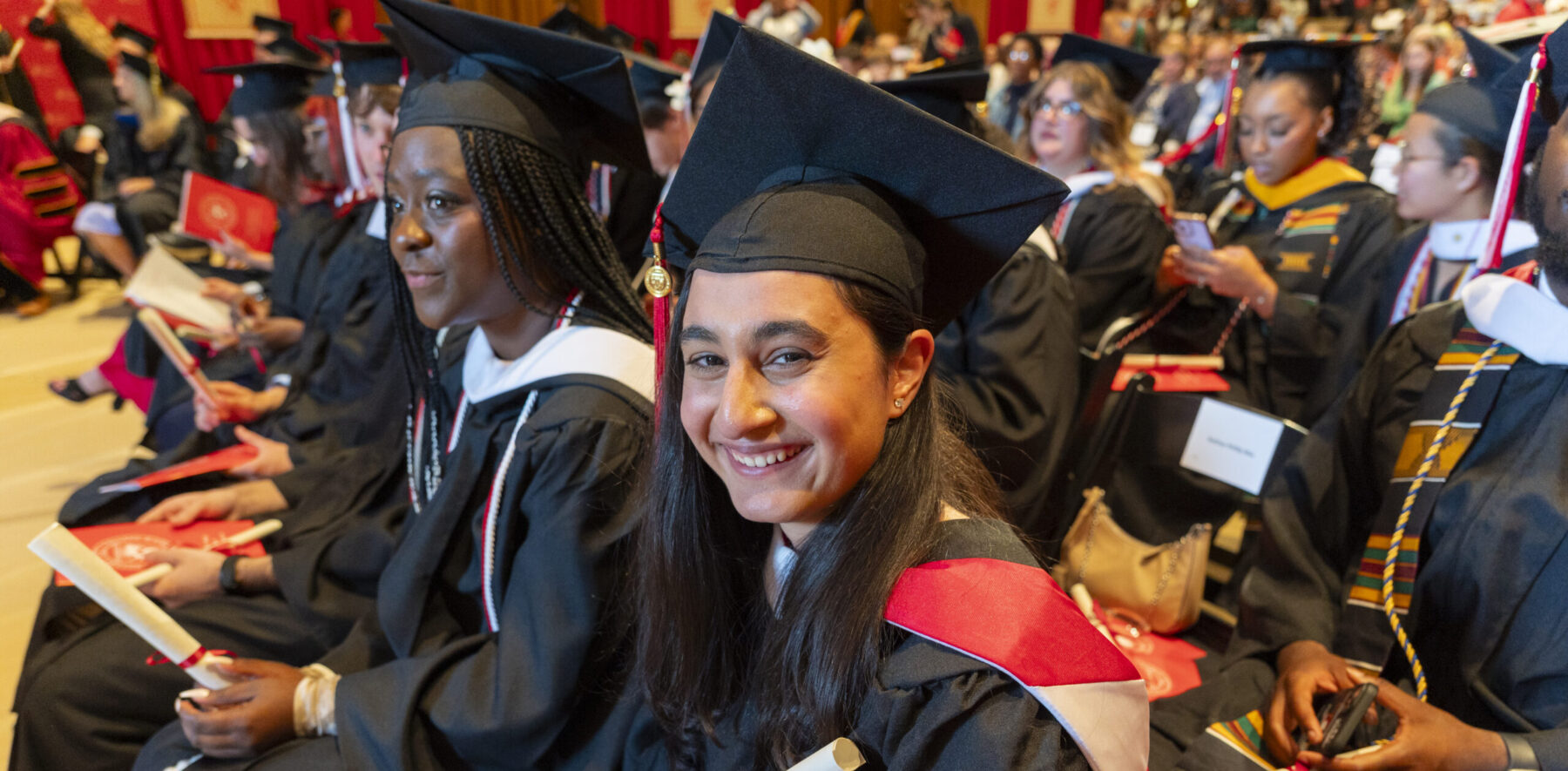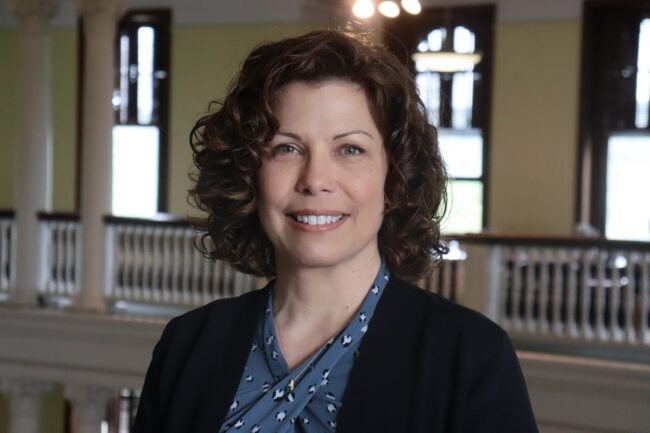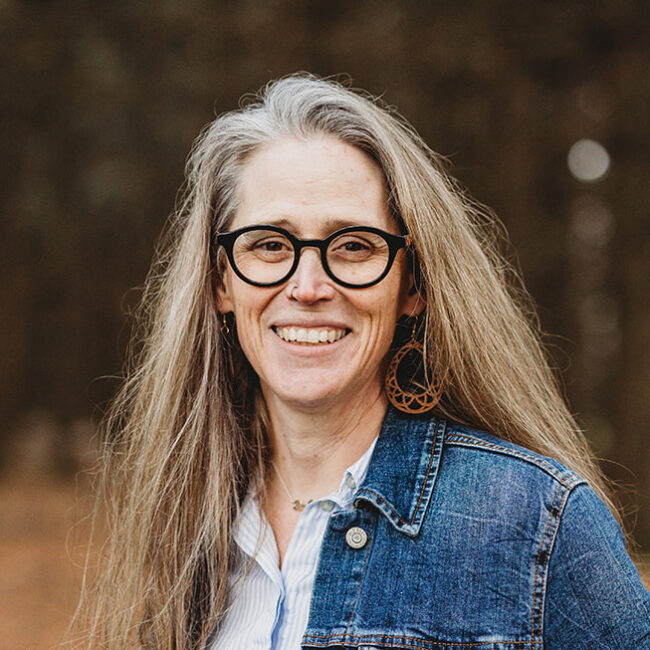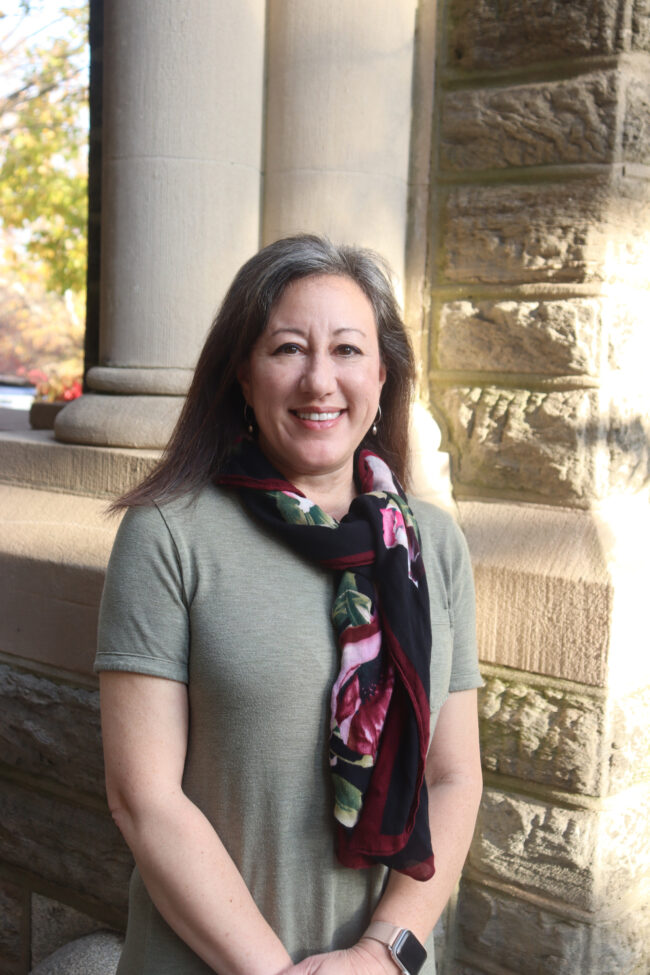Each new student will have a faculty advisor who will advise students about program requirements and mentor them in their profession. Once admitted, students are registered for first semester courses appropriate to their program and learning. Students are encouraged to contact their advisor or program director with any specific advising questions.
Our courses are listed below by program. The code for each program is as follows:
EDLR – Educational Leadership
EDMN – Montessori Education
EDP4 – Early Childhood/PK-4 Elementary Education
EDSC – Secondary Education (7-12)
EDSP – Special Education
EDUC – General Education
An asterisk (*) indicates courses that are are required for many of our programs.
EDLR 600 Conceptual Foundations for School Leadership, 3 credits
This course is an examination of the various philosophical and theoretical bases that can shape teaching and learning in the schools and, therefore, provide direction for the decision-making processes of the school leader. The course will include the exploration of values and beliefs underlying leadership in the schools, how schools are organized, as well as investigating the relationship among the various agencies — local, state and federal — that impact the school. Emphasis of the core functions of leadership in schools and creating and sustaining an inclusive learning environment for all students will be analyzed and discussed.
EDLR 610 Curriculum Theory, Development and Issues, Part 1, 3 credits
This course provides an in-depth study of the major ideologies and theories of curriculum and instruction and design that have shaped curriculum theory and thought. A comprehensive investigation of effective primary and secondary educational programs for contemporary leaders is undertaken. Emphasis will be placed on the translation of ideologies and theories into practice. The course will also focus on managing and developing the teaching/learning process, incorporating the elements of assessment and identifying different philosophies of teaching. Students will begin to analyze how to adapt the curriculum to meet the needs of all students.
EDLR 611 Curriculum Theory, Development and Issues, Part 2, 3 credits
This course provides a continued in-depth study of the major ideologies and theories that have shaped curriculum and instruction and design that have shaped curriculum theory and thought. A specific field component, involving a critique of tone of the curriculum areas outside of the major disciplines (e.g., fine arts, music, physical education, reading in the secondary schools, etc.), or of support services (e.g., special education, counseling, library, nursing, etc.), will be required. The course will emphasize goal-setting, decision-making and the role of the leader in the planning and implementation of curricular design with special attention to student learning styles and strengths for the diverse school population.
EDLR 615 Improvement of Instruction, Staff Development, and Supervision, 3 credits
This course includes a wide-ranging investigation of an array of teaching models and instructional approaches using research, case studies, problem-based learning and discussion on teacher effectiveness. The course will promote an understanding which will enable the leader to facilitate the paramount objective of improving student achievement. The course will also focus on the study of the dynamics of interpersonal and intrapersonal group relations with an emphasis on improving teaching and learning and designing, implementing and evaluating effective staff development programs.
EDLR 620 The Principal as an Effective Agent of Change, 3 credits
This course undertakes an examination of the necessity for the principal to have broad “visions” about the school that are shared, clear, inclusive, ambitious, and performance-oriented. The creation of the climate to achieve such “visions” will also be investigated. In addition, students will come to understand that effective principals are willing to take risks and to seek innovative solutions. Strong emphasis will be placed on emotional intelligence, effective, responsive communication and intergroup relations, essential leadership traits and leadership styles, as well as reflective practice. Students will also explore leadership sustainability, a key force leading to meaningful, long-term change.
EDLR 630 School/Community Relations, 3 credits
The use of language, both oral and written, will be explored and practiced by means of organized sets of experiences relevant to the role of a school leader. These will cover both content and presentation in interpersonal situations such as interviews, discussions, formal and informal speaking, working in print, and with social media (such as Facebook, Twitter, district/school web sites, etc.). They will address both content and structure in such areas as correspondence, staff emails, e-alerts, global messages, reports, and teacher observations. Using a four-prong approach, emphasis will be placed on how to develop a community relations plan that encourages public support, strengthens
parent/guardian and community ties and creates the desired behavior for both the internal and external stakeholders. The focus on parent/guardian and community support and understanding to help increase student achievement will be analyzed. Involvement of the student at the school level will be required.
EDLR 635 School Law, 3 credits
The intent of this course is to familiarize leaders with the basic legal principles governing the structure and operation of school settings and the legal problems encountered in the day-to-day operation of schools. Understanding the legal base for education and the rights and responsibilities of school leaders will be explored through class discussion. The broad principles of school governance as determined by statute and case law, with an understanding of due process, are emphasized. Special attention is given to Pennsylvania statutes, cases and decisions.
EDLR 640 Personnel and Pupil Administration and Management, 3 credits
In this course, students identify what the leader needs to know about school law, student records, collective bargaining, and contract administration, employment relations and special education rights and responsibilities. Source materials will include case studies, grievances, arbitration awards, and contracts.
EDLR 701/702 Principal Internship Part 1 and Part 2, 3 credits each
A vital part of the educational leadership program is the internship, which provides the future leader candidate with the opportunity to integrate theory and research with real-life experiences in the schools. The candidate seeking specialization in leadership must complete a total of 360 hours, the majority of which includes a supervised internship in a school setting covering an entire school year. The candidate, with the internship supervisor, will define a program improvement and/or problem-solving project that will be carried out in the student’s school. The candidate’s Chestnut Hill College supervisor must approve the project. Emphasis of the internship program and on-site projects/activities are aligned with the standards of the Pennsylvania Inspired Leadership Program. The candidate’s Principal/Mentor must be a certified principal who has practiced in Pennsylvania as a principal for at least three years, and agrees to allow the internship and project to take place in their school. The candidate’s Principal/Mentor will be an integral part of the internship. A log of all activities, materials and readings must be kept, and a comprehensive written research-supported report must be submitted during the second semester of the practicum. A formal oral presentation of the report will also be required at that time. In addition to scheduled classroom attendance, there will be ongoing individual
conferences and school visitations by the college professor during the course of the practicum.
EDMN 520 Montessori Philosophy and Educational Theory, 3 credits
Students explore the educational philosophy that influenced Maria Montessori. A second trend, emanating from science and the scientific method, forms a comparative study of her predecessors in the fields of child development, medicine, anthropology and pedagogy. Background relates the pedagogical principles of the Montessori method to today’s educational philosophies and methods. Cross-listed: EDMN-220, MONC 020
EDMN 521 Montessori: Everyday Living/Art, 3 credits
A study of the child’s environment and culture dictates the exercises that aid inner discipline, self-esteem, a sense of order, and muscular control. Montessori pedagogical principles provide the rationale for demonstration of techniques appropriate for the very young child. Prerequisite: EDMN-520 or permission from the Montessori Program Director. Cross-listed: EDMN-221, MONC 021
EDMN 522 Montessori: Sensorial/Music, 3 credits
Provides the rationale and technique undergirding the refinement of sense perceptions as a means of acquiring classified, detailed and accurate knowledge from the environment. Students receive practical insight into the role of movement. Prerequisite: EDMN-520. Cross-listed: EDMN-522, MONC 022
EDMN 523 Montessori: Mathematics, 3 credits
Enables the student to assess a child’s mathematical readiness, to introduce number with its properties of cardinality and ordinality, to develop the mathematical experience to include the basic operations with the didactic apparatus. This course provides preparation for the intern experience. Prerequisite: EDMN-520. Cross-Listed: EDMN-223, MONC 023
EDMN 524 Montessori: Language, 3 credits
Students learn how to design language programs within the prepared Montessori environment. Discussion includes the responsibility of the teacher in the different levels of development that lead to writing and reading, in the sequencing of materials, and in adaptations to specific language needs of children with special emphasis on the urban minority child. Prerequisite: EDMN-520. Cross-Listed: EDMN-224, MONC 024
EDMN 525 Montessori: Natural & Social Sciences/Parent Education, 3 credits
This course provides the student with material for the natural and social sciences used in the Montessori classroom. Presentations are programmed to the age and development of the child. Insights for the student about the wonders of nature, the interaction of human beings and nature are explored. Parent education discussion includes suggestions for developing parent-teacher partnerships and mutual responsibilities. Prerequisite: EDMN 520. Cross-Listed: EDMN-225, MONC 025
EDMN 526 Montessori Education for Peace, 1 credit
Focuses on the essentials of education for peace, which are built into the Montessori curriculum at every level. Emphasis will be on role modeling, conflict resolution, and the teacher’s role in creating a peaceful environment. Cross-listed: EDMN-226, MONC 026
EDMN 630/631 Montessori: FALL Practicum/Internship & Seminar, 5 credits
A year’s internship taken in the student’s senior year which brings together the theory, practice and curriculum of Montessori Education. Corequisite: EDMN-630/631. Cross-Listed: EDMN-430/431, MONC 030/031
EDMN 632/633 Montessori: SPRING Practicum/Internship & Seminar, 5 credits
A year’s internship taken in the student’s senior year which brings together the theory, practice and curriculum of Montessori Education. Corequisite: EDMN-632/633. Cross-Listed: EDMN-432/433, MONC 032/033
EDP4 525 Emerging Literacy and Language Arts, 3 credits
This course will provide students with a thorough understanding of the early cognitive, oral, and aural typical and atypical development of language in children that later affects the development and acquisition of reading and writing. The course will include literacy theory, pedagogies, materials, and methods for infants through the early primary grades. Emphasis will be placed on the importance of developing phonemic and phonological awareness through age appropriate activities. The use and examples of oral tradition and children’s literature appropriate to the young child will be included.
EDP4 527 Early Childhood Math and Science Methods, 3 credits
The students in this course will explore theoretical and conceptual fundamental content and pedagogy in science and mathematics for young children in Pre-School and Primary School settings. Use of state and professional standards and competencies are used to teach key mathematical and science concepts to support students in planning lessons, units and projects. An inquiry-based, child-centered focus is used to actively involve
students in a variety of manipulative materials and representations that can be applied to teaching science and mathematics to diverse PreK-4 learners.
EDP4 528 Early Childhood Integrated Methods: Social Studies, Humanities, and the Arts, 3 credits
This course presents an analysis of the content, methods, and materials in the design and implementation of PreK-4 Social Studies, Humanities, and the Arts. An emphasis will be placed on a thematic approach to developing curricular units and lesson plans. Hands-on, interactive learning for inclusive classrooms is emphasized which will culminate in an inquiry based integrated content and pedagogy. A variety of research-based teaching and assessment methods and strategies are examined and applied in lesson planning.
EDP4 533 Early Childhood Student Teaching, 3 credits
Specific information and details regarding student teaching are found in the Student Teaching Manual provided to students prior to the beginning of their placements. All regulations outlined in the Student Teaching Manual are required to be followed. Students must have current PA clearances for field experience and student teaching Incidents must be disclosed and reviewed to determine eligibility. Incidents must be disclosed and reviewed to determine eligibility. Candidates must take certification tests prior to student teaching. Student Teaching provides qualified students with a semester of practical teaching experience in a PreK-4 classroom. The student teacher will work under the guidance of a mentor teacher and the college supervisor. It is expected that students will integrate and apply the knowledge, skills, and dispositions gained in Education courses to the design and implementation of effective instruction and assessment. Students will spend each day of the 15 week semester at the school site. The first three weeks of the placement are considered field experience, after which candidates move into the student teaching phase of their clinical student teaching requirements. Performance-based assignments are linked to PDE field competencies and evidenced in students’ portfolio completion. Students must have current PA clearances to begin the student teaching experience. Co-Requisites: EDP4 534. Prerequisites: Completion of coursework in Education; approval of the Department; and an overall GPA of 3.0 or higher is required.
EDP4 534 Early Childhood Student Teaching Seminar, 3 credits
The seminar experience affords students the opportunity to share teaching insights, concerns, and research with peers and supervisors. Students will synthesize theories learned with what is occurring in actual practice. Students will make critical judgements about theory application into practice. Students’ portfolio will be finalized and evaluated.
Co-Requisites: EDP4 533. Prerequisites: Completion of coursework in Education; approval of the Department; and an overall GPA of 3.0 or higher is required.
EDP4 590 Intern Field Experience I, 1.5 credits
This semester long course is the first half of a required mentoring component of all students teaching on an Intern certificate in the Early Education program. Students are visited at least once per month by a student teaching supervisor to observe, mentor and support interns in meeting beginning teaching competencies.
EDP4 595 Intern Field Experience II, 1.5 credits
This semester long course is the second half of a required mentoring component of all students teaching on an Intern certificate in the Early Education program. Students are visited at least once per month by a student teaching supervisor to observe, mentor and support interns in meeting beginning teaching competencies. Students are formally assessed using the PDE 430 form as a mid-term evaluation and again during EDP4 534.
EDSC 517 Special Methods in Areas of English for Secondary Education, 3 credits
This advanced special methods course contains special content and methods of instruction for secondary certification in English. Students will understand the criteria and techniques for selecting, organizing, and presenting English subject matter. Students will become familiar with Pennsylvania and Common Core (if applicable) subject area standards and effective teaching strategies as well as techniques for classroom assessment and evaluation. Emphasis will be placed on student presentations and the use of technology appropriate for the subject area.
EDSC 518 Special Methods in Social Studies for Secondary Education, 3 credits
This advanced special methods course contains special content and methods of instruction for secondary certification in Social Studies. Students will understand the criteria and techniques for selecting, organizing, and presenting Social Studies subject matter. Students will become familiar with Pennsylvania and Common Core (if applicable) subject area standards and effective teaching strategies as well as techniques for classroom assessment and evaluation. Emphasis will be placed on student presentations and the use of technology appropriate for the subject area.
EDSC 519 Special Methods in Biology/Chemistry for Secondary Education, 3 credits
This advanced special methods course contains special content and methods of instruction for secondary certification in Biology or Chemistry. Students will understand the criteria and techniques for selecting, organizing, and presenting science subject
matter. Students will become familiar with Pennsylvania and Common Core (if applicable) subject area standards and effective teaching strategies as well as techniques for classroom assessment and evaluation. Emphasis will be placed on student presentations and the use of technology appropriate for the subject area.
EDSC 520 Special Methods in Mathematics for Secondary Education, 3 credits
This advanced special methods course contains special content and methods of instruction for secondary certification in Mathematics. Students will understand the criteria and techniques for selecting, organizing, and presenting Mathematics subject matter. Students will become familiar with Pennsylvania and Common Core (if applicable) subject area standards and effective teaching strategies as well as techniques for classroom assessment and evaluation. Emphasis will be placed on student presentations and the use of technology appropriate for the subject area. This course is identified as a Stage III field experience course and will include assignments that meet PDE identified required competencies (30 hours).
EDSC 521 Special Methods in Foreign Language for Secondary Education, 3 credits
This advanced special methods course contains special content and methods of instruction for secondary certification in Spanish or French, levels K-12. Students will understand the criteria and techniques for selecting, organizing, and presenting foreign language subject matter. Students will become familiar with Pennsylvania and Common Core (if applicable) subject area standards and effective teaching strategies as well as techniques for classroom assessment and evaluation. Students become familiar with the ACTFL guidelines and the National Standards for Modern Languages and learn how to incorporate them into their teaching. Emphasis will be placed on student presentations and the use of technology appropriate for the subject area.
EDSC 526 Secondary Methods & Assessment, 3 credits
This course provides secondary students across disciplinary areas with foundational knowledge of applicable national standards, content-specific PA Academic and PA Core Standards, and secondary curricula. Research-based pedagogical practices will be used to address lesson planning and unit preparation, grading, tracking, inclusion and physical and mental health of adolescents, as well as assessment of learning in diverse secondary classrooms.
EDSC 533 Secondary Student Teaching, 3 credits
Student Teaching provides qualified students with a semester of practical teaching experience in a 7-12 classroom. The student teacher will work under the guidance of a
mentor teacher and the college supervisor. It is expected that students will integrate and apply the knowledge, skills, and dispositions gained in Education courses to the design and implementation of effective instruction and assessment. Students will spend each day of the 15 week semester at the school site. The first three weeks of the placement are considered field experience, after which candidates move into the student teaching phase of their clinical student teaching requirements. Performance-based assignments are linked to PDE field competencies and evidenced in students’ portfolio completion. Students must have current PA clearances to begin the student teaching experience. Incidents must be disclosed and reviewed to determine eligibility. Co-Requisites: EDSC 534. Prerequisites: Completion of coursework in Education; approval of the Department; and an overall GPA of 3.0 or higher is required.
EDSC 534 Secondary Student Teaching Seminar, 3 credits
The seminar experience affords students the opportunity to share teaching insights, concerns, and research with peers and supervisors. Students will synthesize theories learned with what is occurring in actual practice. Students will make critical judgements about theory application into practice. Students’ portfolio will be finalized and evaluated. Co-Requisites: EDSC 533. Prerequisites: Completion of coursework in Education; approval of the Department; and an overall GPA of 3.0 or higher is required.
EDSC 590: Intern Field Experience I, 1.5 credits
This semester long course is the first half of a required mentoring component of all students teaching on an Intern certificate in the Secondary Education program. Students are visited at least once per month by a student teaching supervisor to observe, mentor and support interns in meeting beginning teaching competencies.
EDSC 595: Intern Field Experience II, 1.5 credits
*EDSP 522 Literacy Across the PreK-12 Continuum: Instruction/Assessment and Intervention of Students with Reading and Writing Differences, 3 Credits
This course is designed to develop expertise in the areas of evaluation and diagnosis of students who are struggling with reading and writing. Students will gain an in-depth understanding of how to select and administer a variety of diagnostic, formal and informal assessments, as well as interpret and communicate those results to school personnel and the child’s family. Application of knowledge includes hands-on exposure to a variety of assessments and investigation of clinical case studies diagnosing the strengths and needs of a struggling learner. Course will provide students with a strong foundation in the theory, pedagogies, methods, and activities related to reading, writing, and literacy instruction for
all children. Literacy acquisition of both typical and atypical learners across the PreK-12 continuum will be explored, including children who have learning differences or are acquiring English as a second language. Narrative and expository text will be used to demonstrate how the rich language and artwork of books can be used across the curriculum to enhance literacy instruction.
*EDSP 530: Theory and Pedagogy in Special Education, 3 credits
This course is designed to provide a complete overview of special education including historical, legal and cultural foundations of special education, and the main historical figures who changed the landscape of services for children and adults with disabilities. This course will expose students to recent federal and state regulations pertaining to the rights, responsibilities, and privileges of students, parents, and teachers. This includes understanding and discussing the evaluation process (referral, assessment, identification, continuum of placements [least restrictive environment], and timelines); as well as the various environments (inclusion, intervention strategies), services and implementation, which are appropriate and necessary to provide for children with disabilities.
*EDSP 532: The English Language Learner, 3 credits
In this course, students will build the professional knowledge, skills, and dispositions for creating culturally responsive teaching and learning environments with PK-12 English learners (ELs) across disciplinary areas. Emphasis is placed on accounting for ELs’ differences in terms of cultural, linguistic, and educational backgrounds when designing, scaffolding, and differentiating instruction and assessments. A primary focus is on culturally responsive teaching (CRT) practices that honor ELs’ funds of knowledge and allow for the integration of social, instructional, and academic language development with learning standards-aligned content across grade levels and disciplinary areas. Lesson design is linked to PA/WIDA English Language Proficiency Standards and PA Core Academic Standards for reading, writing, listening, speaking, and language. Other key topics include major laws and policies related to educating ELs and important considerations for distinguishing language learning from learning differences. Students will also explore communicating positively with culturally and linguistically diverse families, and community and online resources for school personnel, parents, and ELs.
*EDSP 535 Special Education: Evaluation/Assessment and the Law, 3 Credits
This course is designed to examine relevant and current practices in assessment and evaluation of students with disabilities. Participants will study the impact of informal as well as standardized testing requirements and their effect on students with disabilities. Legal ramifications as aligned with state and federal regulations and policies related to
special education, Americans with Disabilities Act (ADA) and civil rights will be reviewed and discussed. In addition, adaptations and accommodations including alternate assessment for students with disabilities being tested in a variety (i.e. classroom assessment, mandated state tests, IEP specially designed instruction, and others) of school related circumstances will be examined from different perspectives.
EDSP 590 Intern Field Experience I, 1.5 credits
This semester long course is the first half of a required mentoring component of all students teaching on an Intern certificate in the Special Education program. Students are visited at least once per month by a student teaching supervisor to observe, mentor and support interns in meeting beginning teaching competencies.
EDSP 595 Intern Field Experience II, 1.5 credits
This semester long course is the second half of a required mentoring component of all students teaching on an Intern certificate in the Special Education program. Students are visited at least once per month by a student teaching supervisor to observe, mentor and support interns in meeting beginning teaching competencies. Students are formally assessed using the PDE 430 form as a mid-term evaluation.
EDSP 621 Classroom Management for Students with Disabilities, 3 credits
The content and practice knowledge needed to create an effective learning environment for students with disabilities in inclusive and/or separate learning environments are examined in this course. Course content includes the selection, evaluation, and interpretation of specific behavioral assessments (including informal, functional, ecological and behavioral assessments). There is a focus on utilizing appropriate management strategies in the classroom from a theoretical and pedagogical perspective. Students will be exposed to the process of developing behavioral intervention plans for diverse learners.
EDSP 623: Education Practice and Assistive Technology for Students w/LD and/or ED (High Incidence) and (Low Incidence) Disabilities, 3 credits
This course examines research, current practice and historical retrospective regarding the education of students with high and low disabilities. Analysis of learning, emotional/social disorders and physical and cognitive disabilities will be required. Inclusive classroom methodologies, assistive technology applications and modifications and adaptations to the curriculum, including behavioral assessments and management techniques will be addressed. Candidates will be afforded the opportunity to apply learned pedagogy in a 40- hour Extended School Year Program field placement under the mentorship of a certified
teacher. This placement will encompass both high, low incidence students, and be at either the PreK-6 or 7-12 grade level. Candidates will prepare lessons and learning materials for classroom instruction. A faculty member will supervise candidates at their placement site. The faculty supervisor in conjunction with the cooperating teacher will mentor candidates. The faculty supervisor will observe and provide feedback oral and written to candidates a minimum of two times. Course assignments include a time log (see Attachment B), weekly journals, lesson plans, and teaching reflections. Course time will be set aside each week to link field experience to course content and practices in their field experience placements. This course is identified as a Stage III field experience course and will include assignments that meet PDE identified required competencies (40 hours).
EDSP 631 Aspects of PreK-12 Transition: Early Intervention and Transition for Students with Disabilities, 3 Credits
In this course students identify resources and techniques used across all transition points to allow for the effective programming for students with disabilities. Students will investigate the characteristics of young children with disabilities in how to determine early diagnosis and how to access appropriate services while working with families, local community agencies and resources. Course will include analysis and interpretation of assessment data in order to develop and implement an Individual Family Service Plan (IFSP). In addition, students examine key aspects associated with Indicator 13 Secondary Transition Services. Course study includes examination of factors associated with implementation of activities and services for students ages 14-21 and writing coordinated, measurable, annual Individualized Education Program (IEP) goals that will enable students ages 14 and above to meet their postsecondary outcomes.
EDSP 657 Student Teaching-7 weeks elementary/7 weeks secondary, 3 Credits
Specific information and details regarding student teaching are found in the Student Teaching Manual provided to students prior to the beginning of their placements. All regulations outlined in the Student Teaching Manual are required to be followed. Students must have current PA clearances for field experience and student teaching Incidents must be disclosed and reviewed to determine eligibility. Incidents must be disclosed and reviewed to determine eligibility. Candidates must take certification tests prior to student teaching.
Student Teaching provides qualified candidates with a semester of practical special education teaching experience in a PreK- Secondary classroom across the special education service continuum. The student teacher will work under the guidance of a mentor teacher and the college supervisor. It is expected that students will integrate and
apply the knowledge, skills, and dispositions gained in Special Education and Education courses to the design and implementation of effective instruction and assessment. Student Teaching placements are 14 weeks. Candidates may have two 7-week placements or one 14-week placement. Candidates will spend each day of the 14-week semester at the school site. The student teaching placement will be within different grade span than field experience Stage 3 and at least one placement will be inclusive. Performance-based assignments are linked to PDE field competencies and evidenced in students’ portfolio completion. Students must have current PA clearances to begin the student teaching experience. Prerequisites: Completion of coursework in Education: approval of the Department: an overall GPA of 3.0 or higher is required.
EDSP 658 Special Education Student Teaching Seminar, 3 Credits
The seminar experience affords students the opportunity to share teaching insights, concerns, and research with peers and supervisors. Students will synthesize theories learned with what is occurring in actual practice. Students will make critical judgements about theory application into practice. Students’ portfolio will be finalized and evaluated. Prerequisites: Completion of coursework in Education: approval of the Department: an overall GPA of 3.0 or higher is required.
*EDUC 520: Educational Research and Evaluation, 3 credits
This course provides students with the fundamental aspects and processes of research using a five-step model (Introduction; Literature Review; Methods; Results; Discussion section) to guide development and design of a research paper. Students in this course select a research topic in education particularly as it relates to academic, behavioral, emotional and social issues. Simultaneously, students review, discuss, and incorporate into their papers the underpinnings of educational research such as assessment, evaluation, and qualitative methodologies for measurement. Included in this course are the basics of APA Style Standards for writing at the graduate level. Required of all Master’s degree candidates.
*EDUC 620 Child and Adolescent Development and Theory/Birth through Adulthood (Stage 1 Field Experience), 3 Credits
The focus of this course is on the study of development from birth to young adulthood. Students explore current theory and research in the areas of physical, emotional, language, social, cognitive, and cultural behaviors. The interaction of biological and environmental factors influencing growth and development is stressed. This course also applies psychological principles of growth and development, thinking, learning and motivation to education in the home, school and community. This course is identified as a Stage I field experience course and will include assignments that meet PDE identified required competencies (20 hours).
*EDUC 621 Foundations of Education Pre-K-12/Organization and Structure of Schools (Stage II Field Experience), 3 Credits
In this course students explore the historical, philosophical, and social foundations of education from PreK-12 and their relationship to the present day. The course provides a framework and tools to analyze, synthesize, and evaluate current issues. This course places the structure and organization of schools in historical perspective and relates both the roles of teacher and school organization to society. The differences between education and schooling are examined, and current educational reform movements are explored within the context of critical educational theory. This course is identified as a Stage II field experience course and will include assignments that meet PDE identified required competencies (20 hours).
EDUC 630 Integrated Methods Across the PreK-12 Classroom: Science, Technology, Engineering, the Arts and Mathematics (STEAM), 3 Credits
This course addresses the analysis and application of methodology and instructional techniques in the content area of PreK-12 Science and Math Methods with an emphasis on the integration of technology and the arts. Developmental, constructive, and process skills approaches will be emphasized. Students will experience a hands-on, inquiry-based format with direct application for teaching PreK-12 science. This course provides an overview of the teaching techniques and materials used in contemporary math and science programs with a focus on inquiry skills and inductive and deductive reasoning through hands-on and minds-on investigations. This course includes the major strands of science including life science, physical science, earth and space science, and crosses curricula to integrate literacy learning, social sciences, and the arts. Students will develop age-appropriate lesson plans linked to PA Academic Standards/PA Alternate Academic Standards/Anchors for Science, Technology, and Engineering as well as Environment and Ecology along with Next Generation Science Standards (NGSS). Math methods will focus on the mastery of PA Academic Standards and PA Alternate Academic Standards/Anchors for Math moving from concrete to abstract understanding.
EDUC 704: Independent Study, 3 credits
The Independent study format gives students an opportunity to develop critical thinking and individual initiative through planned scholarly endeavor. Under the guidance of a faculty sponsor the student will investigate an area of interest related to the student’s course of study and to his/her teaching situation. The student will work under the guidance of a faculty member and with the permission of the Department Chair. The interested student must produce a project, paper, or piece of research demonstrating ability to pursue an independent academic endeavor as well as competence in researching, organizing and presenting information.






